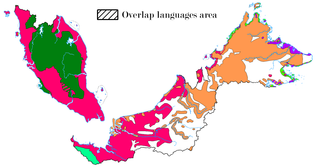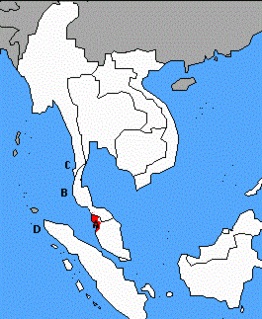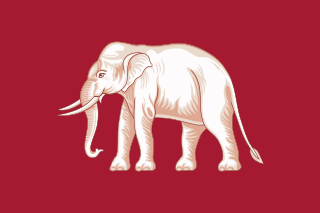
The term Unfederated Malay States was the collective name given to five British protected states in the Malay peninsula in the first half of the twentieth century. These states were Johor, Kedah, Kelantan, Perlis, and Terengganu. In contrast with the four adjoining Federated Malay States of Selangor, Perak, Pahang, and Negri Sembilan, the five Unfederated Malay States lacked common institutions, and did not form a single state in international law; they were in fact standalone British protectorates.

Sir Frank Athelstane Swettenham was a British colonial administrator who became the first Resident general of the Federated Malay States, which brought the Malay states of Selangor, Perak, Negeri Sembilan and Pahang together under the administration of a Resident-General based in Kuala Lumpur. He served from 1 July 1896 to 4 November 1901. He was also an amateur painter, photographer and antique collector.
Kelantan-Pattani Malay, often referred to in Thailand as Yawi or Jawi, and in Kelantan as Baso Kelaté, is an Austronesian language and a Malayic / Malayan language spoken in the Malaysian state of Kelantan and the neighbouring southernmost provinces of Thailand. It is the primary spoken language of Thai Malays, but is also used as a lingua franca by ethnic Southern Thais in rural areas, Muslim and non-Muslim, and the samsam, a mostly Thai-speaking population of mixed Malay and Thai ancestry.

The Semai are a semi sedentary ethnic group living in the center of the Malay Peninsula in Southeast Asia, known especially for their nonviolence. They speak Semai, an Austroasiatic language closely related to Temiar, spoken by Temiars nearby. The Semai are bordered by the Temiars to the north and the Jah Hut to the South. The Semai belong to the Senoi group, and are one of the largest indigenous ethnic group in the Peninsula and the largest of the Senoi group. Most Semai subsist by cultivating grain crops, hunting, and fishing.

The term "British Malaya" loosely describes a set of states on the Malay Peninsula and the island of Singapore that were brought under British control between the 18th and the 20th centuries. Unlike the term "British India", which excludes the Indian princely states, British Malaya is often used to refer to the Malay States under indirect British rule as well as the Straits Settlements that were under the sovereignty of the British Crown.
The Malay or Malayan languages are a group of closely related languages spoken by Malays and related peoples across Brunei, Indonesia, Malaysia, Singapore, Southern Thailand, and the far southern parts of the Philippines. They have traditionally been classified as Malay, Para-Malay, and Aboriginal Malay, but this reflects geography and ethnicity rather than a proper linguistic classification. The Malayan languages are mutually intelligible to varying extents, though the distinction between language and dialect is unclear in many cases.

The indigenous languages of Malaysia belong to the Mon-Khmer and Malayo-Polynesian families. The national, or official, language is Malay which is the mother tongue of the majority Malay ethnic group. The main ethnic groups within Malaysia comprise the Malays, Chinese and Indians, with many other ethnic groups represented in smaller numbers, each with its own languages. The largest native languages spoken in East Malaysia are the Iban, Dusunic, and the Kadazan languages. English is widely understood and spoken in service industries and is a compulsory subject in primary and secondary school. It is also the main language spoken in most private colleges and universities. English may take precedence over Malay in certain official contexts as provided for by the National Language Act, especially in the states of Sabah and Sarawak, where it may be the official working language.

Kedah Malay or Kedahan also referred in Thailand as "Syburi Malay" (ภาษามลายูไทรบุรี) is a variety of the Malayan languages mainly spoken in the northwestern northern Malaysian states of Perlis, Kedah, Penang, and northern Perak and in the southern Thai provinces of Trang, Satun and parts of Yala, the usage of Kedahan Malay was historically prevalent in southwestern Thailand before being superseded by the Thai language. Enclaves of Kedahan Malay language can be found in Kawthaung District in Myanmar, Jaring Halus, Langkat in Indonesia and Bangkok, Thailand, mostly by the descendants of historical settles from Kedah.

The Dutch Fort is a fort in Pangkor Island, Manjung District, Perak, Malaysia. The ruins are the remnants of an outpost of Dutch attempts to control trade in the Malay peninsula. In the Malay language, the fort is called Kota Belanda. The Dutch called it Fort Dindingh, after the Dinding River, on the mainland of Perak, Malaysia.
Sarawak Malay is a Malayic language native to the State of Sarawak. It is a common language used by natives of Sarawak. This variant is related to Bruneian Malay, spoken in the districts of Limbang and Lawas (Sarawak) and Pontianak Malay, which is spoken in the neighbouring West Kalimantan province in Indonesia. There is some debate on whether it is a vernacular variety of Malay or a separate language altogether. It is more similar to Ibanic languages compared to the Malay dialects of Sumatra and the Malayan Peninsula, which makes it mutually unintelligible for Malay speakers outside Sarawak and Borneo..

Suria FM is a Malay language-private radio station of the Star Media Radio Group, a company owned by Star Publications (M) Berhad. The station is targeted modern Malays, aged between 25 to 34. They enjoy interacting through social media, whether on the go through mobile devices or on their own laptops. With celebrity packed line up of presenters, Suria FM has kept Malaysians entertained with a dose of their cheerness or ceria-ness since it was first aired in 2005. Featuring a varied mix of local all-time favourites, chart topping hits with a shot of the latest Indonesian and K-pop songs. SuriaFM promises all day all weekend fun listening while learning a thing or two with their brand of laidback intelligence.
Rawa or Rao is a term given to a Minangkabau people who come from Rao, West Sumatra. In the Malay Peninsula, now the West Malaysia, it is common for the Rawa to identify themselves as Ughang Rawo or Ughang Rao or even Rao.

Dato Maharaja Lela was a Malay nationalist from Perak.
Dato' Sri Haji Tajuddin bin Abdul Rahman is a Malaysian politician. He is also the incumbent Member of Parliament of Malaysia for the Pasir Salak constituency in the state of Perak since 2008 and a former Deputy Minister of Agriculture and Agro-based Industry. He is a member of the United Malays National Organisation (UMNO), a major component party in the opposition Barisan Nasional (BN) coalition.

The Perak State Legislative Assembly is the unicameral state legislature of the Malaysian state of Perak. It is composed of 59 members representing single-member constituencies throughout the state. Elections are held no more than five years apart, along with elections to the federal parliament and other state assemblies.

Sultan Idris Education University (Malay: University Pendidikan Sultan Idris; commonly abbreviated as UPSI; Jawi: اونيۏرسيتي ڤنديديقن سلطان إدريس is a public university in the town of Tanjung Malim, Perak in Malaysia. First established in 1922 as a teachers college, it is one of the oldest functioning institutions of higher learning in Malaysia.

Perakian Malay people refers to a group of Malay people originating from the Malaysian state of Perak. As of 2010, it is estimated that the population of the Perakian Malays in Perak are about 55.74% of the state's population.

The Kingdom of Reman or Kingdom of Rahman was a landlocked traditional Malay kingdom established in the northern Malay Peninsular. It became one of the seven states of Persekutuan Pattani Besar between 1810 and 1902. Tuan Mansor, a member of the Pattani aristocracy was ascended to the throne of Reman in 1810. Until 1909, the boundary of the state was not only confined to the present-day Raman District, but also covered most of Yala province in Thailand, Hulu Perak and parts of Ulu Kelantan in Malaysia.
















